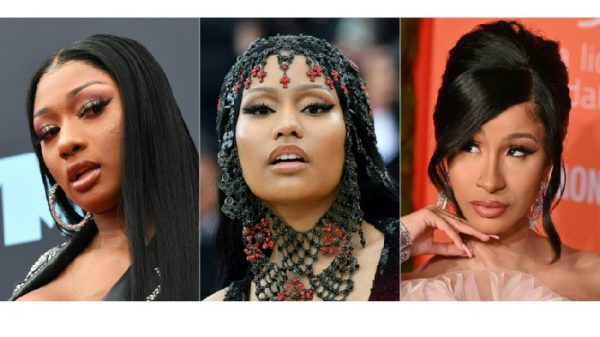Long snubbed, women of rap break old molds and claim their due

- Update Time : Tuesday, February 4, 2020
- 206 Time View

Long stereotyped as a boys’ club, not least for its braggadocious lyrics and objectification of women, the rap world has seen a bevy of female stars reclaim their space.
Over the past decade, diverse talent has climbed up through hip-hop’s ranks, as women shun old ideas about what makes their acts marketable and the internet opens new avenues to stardom.
Women were prominent players in rap’s formative years — the fierce list includes Salt-N-Pepa, MC Lyte, Foxy Brown, Lil’ Kim, Lauryn Hill, Missy Elliott and Queen Latifah — and set the stage for future generations, leaving indelible marks on hip-hop’s DNA.
But if the 1990s saw women carve out room to shine, the 2000s saw them pushed aside, with labels fumbling to survive as illegal music downloads began upending standard procedure.
“The industry took a nosedive — when it came to cutting the costs of everything, of course women were the ones who felt it the hardest,” said Kathy Iandoli, whose recent book “God Save The Queens” details the trajectory of women in rap.
Throughout the 1980s and early 1990s, dozens of women rappers were signed to major labels at any given time, but by 2010, the number hovered at around three, according to the documentary “My Mic Sounds Nice: The Truth About Women in Hip Hop.”
Women who did get a break were pigeonholed as either hypersexual or tough lyricists, with the industry often pitting them against each other — perpetuating the idea that only one rap queen could rule at a time.
Major Minaj
Still, there was no shortage of innovation coming from artists even if labels weren’t supporting them.
“Napster made record companies lose their minds, but it created a very strong underground,” Iandoli said of the pioneering music-sharing service.
“It set up the ability to create a career in a way that had never been done before, because people weren’t so hellbent on getting a label.”
Nicki Minaj, a provocative walking work of art with a lightning-speed flow, burst onto the scene in 2010 and began changing the game.
“She was the first female hip-hop artist to really break through during that lull,” Iandoli said of the Trinidadian-born artist from Queens.
“Nicki was the first in a very long time who was both sexy and lyrical, so she appealed to the street rap crowd, and then men who just wanted to hear women rapping about sex.”
Minaj — who announced her retirement from rap last year, though fans are skeptical — herself has claimed credit for “reintroducing the successful female rapper back to pop culture.”
“When I came out, there had been a drought of a few years where NO female rap album had gone platinum, females weren’t getting budgets, the industry did NOT believe in the female rapper anymore. They had stopped generating MONEY for labels,” she wrote on Instagram in 2017.
“[I] showed big business we were major players in the game just like the boys were.”
‘Unfiltered chance’
The post-Minaj world features a growing pantheon including, but not limited to: America’s sassy brash sweetheart Cardi B, hardcore hottie Megan Thee Stallion, punk head-banger Rico Nasty, the fast-rising duo City Girls and surrealist auteur Tierra Whack.
Queens rapper Dai Burger said platforms like the video-streaming service YouTube and the DIY discovery site SoundCloud — not to mention Instagram’s self-promotion powers — opened a wealth of possibilities for women shunned by mainstream labels.
“Back in the 90s and the early 2000s, to be an artist, you had to have a big major label pushing for your video to be on TV,” she told AFP at her recording studio in Brooklyn.
“The internet… gave us an unfiltered chance to do what we wanted,” said the statuesque artist with sparkling nail extensions, luxurious scarlet hair and leather overalls.
Before, “you had to have those people… sign off on you, and you had to look a certain way and to be a certain way,” she continued.
“Whereas when the internet came, I don’t need anyone’s permission to be in the public eye — like, I’m just going to do it.”
‘Camaraderie’
Dai Burger — who is queer and fuses sex-positive, unapologetic lyricism with heavy club beats — said these days, “there’s more camaraderie with women” in the rap world.
“There’s so much room for all of us. There’s a thousand guys in the industry, you know, doing their thing,” she said. “The girls want some action!”
The ascent of hip-hop’s women is not without naysayers, of course: rapper and producer Jermaine Dupri last year complained the contemporary crop of women was sex-obsessed and lacked vision.
Cardi B, who once worked as a stripper, clapped back: “First of all, I rap about my pussy because she my best friend.”
“There’s a lot of female rappers that be rapping they ass off,” she said in an Instagram rant. “Y’all don’t be supporting them and they be mad dope.”
Iandoli is “cautiously optimistic” the growing guard of women rappers is here to stay.
She said “women work smarter” and are more strategic in their bids to get ahead.
“The ethos is different — when you’re buying into an industry where you know the odds are against you, you have to move differently than the guys.”
“I don’t think there’s a single woman who takes for granted her ability to get in the room,” Iandoli continued.
“This didn’t happen by chance, it happened by hard work.”















